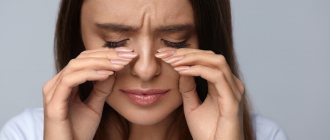Menopausal syndrome
in women it is a whole complex of symptoms that arise during menopause against the background of declining reproductive function.
- Menopausal syndrome
- Symptoms
- Our services
- Our doctors
- Price-list
- Analyzes
- Make an appointment
These symptoms complicate the normal (physiological) course of the menopause due to the following reasons:
- too sharp a decrease in estrogen production,
- mismatch in the functioning of the endocrine system,
- the presence of concomitant diseases and conditions that affect the course of menopause (gynecological diseases and past abortions, autonomic disorders, endocrine pathology, cardiovascular diseases, psychological discomfort, traumatic brain injuries, etc.).
After menopause, climacteric syndrome is observed 1.5-2 times more often than in premenopause. Its typical symptoms are especially common in the first 2-3 years of postmenopause.
Menopausal syndrome, symptoms
During menopause, a woman may experience a number of unpleasant sensations. Symptoms can vary in intensity and be present in different combinations. They are divided into several groups.
Neurovegetative symptoms:
- tides;
- sweating;
- changes in blood pressure;
- chilling;
- nausea, abdominal pain;
- dizziness, headaches;
- heartache;
- palpitations.
Metabolic-endocrine symptoms:
- swelling, weight gain;
- engorgement of the mammary glands, mastopathy;
- flatulence;
- vaginal dryness, spotting, bleeding;
- skin atrophy, itching;
- urinary incontinence, painful urination;
- pain in bones and joints;
- increased blood cholesterol levels.
Psycho-emotional symptoms:
- irritability;
- decreased libido;
- sudden mood changes;
- tearfulness;
- aggressiveness;
- anxiety;
- depression, apathy;
- forgetfulness, deterioration of concentration;
- insomnia;
- inexplicable sensations (tingling, goosebumps, etc.).
How to treat depression during menopause
Severe depression is defined as feeling depressed or losing interests and pleasures for two weeks or more. Signs of depression include: daily low mood for most of the day, significant changes in weight or appetite, changes in sleep patterns, feelings of hopelessness, loss of interest in previous activities, persistent thoughts of death or suicide, inability to concentrate, fatigue or loss of energy.
According to research, if you feel constantly depressed, exercise and talking to an endocrinologist who can prescribe hormone therapy can help.
Keep in mind that yoga and meditation may only reduce stress or anxiety if you have mild depression. If you have severe depression, consult an endocrinologist, as this may require medication.
If you find an error, please select a piece of text and press Ctrl+Enter
Hot flashes during menopause
The most constant and early symptom is hot flashes during menopause - periodically occurring redness of the skin and a feeling of heat in the face, neck, and chest. Hot flashes are often accompanied by sweating, headache, palpitations and insomnia. Based on the number of hot flashes per day, the following forms of menopausal syndrome are distinguished:
- mild - up to 10 hot flashes per day,
- average - 10-20 hot flashes with characteristic symptoms,
- severe - over 20 hot flashes and other pronounced manifestations.
It should be noted that the variety of symptoms of menopausal syndrome is often due to a psychosomatic component, in particular, the anxious attitude of the woman herself to the changes occurring in her body. Therefore, with competent help from a psychotherapist or psychoneurologist, many manifestations of menopause can be mitigated even without medications.
How can you minimize mood swings?
Making some lifestyle changes can help minimize mood swings. If you have problems sleeping, the following basic rules, which experts call “sleep hygiene,” can help:
- Don't drink alcohol or caffeine within four hours of bedtime. Alcohol may help you fall asleep faster, but it also wakes you up when its blood levels drop.
- Try not to nap during the day because it makes it difficult to fall asleep in the evening.
- Eating heavy, spicy or sweet foods can also affect sleep, so try not to eat at night. While there is no scientific evidence to support this claim, some women report that cutting back on spicy foods, alcohol, and caffeine reduces the number of hot flashes they experience, including night sweats. To see if this will help you or not, try experimenting with removing these foods and drinks from your diet.
- Make your bedroom more comfortable for sleeping by setting the heat to a comfortable level, blocking out noise and light as much as possible, and avoid turning on your phone right before bed.
- Many women say that yoga and meditation help improve their mood. Some sections offer yoga classes specifically for women experiencing menopause. Regular exercise also helps you feel better overall.
Discharge during menopause
During premenopause, menstruation gradually loses its former regularity: it may occur later or earlier than expected. Their intensity changes - and it can either decrease or increase. Occasional intermenstrual discharge is possible - light, “spotting”, brownish in color.
So-called menopausal bleeding, associated with impaired production of sex hormones, develops in women aged 40-50 years, before menopause. Typically, such bleeding begins after a missed period, but it may coincide with the expected period or even begin a little earlier. It differs from regular menstruation in its long duration - up to several weeks.
The intensity of such bleeding may vary and may be repeated. Sometimes they are quite abundant, even threatening health and life.
Menopausal bleeding requires treatment in a hospital, usually responds to hormone therapy, but surgery may also be required. As a rule, diagnostic curettage is required to clarify the diagnosis in such cases. This is necessary in order not to miss possible hyperplasia (overgrowth) of the endometrium, its polyps and other conditions that are also manifested by uterine bleeding. Treatment tactics will depend on the correct diagnosis.
Uterine bleeding that occurs in postmenopause is much more dangerous, as it often indicates a serious illness. For example, spotting in a woman not receiving hormone replacement therapy that occurs several years after menopause can be caused by uterine cancer or ovarian tumors. In this case, it is necessary to undergo a thorough medical examination as quickly as possible with mandatory separate diagnostic curettage of the mucous membrane of the cervix and body of the uterus. Early diagnosis allows for timely successful treatment.
Panic attack
A panic attack develops very quickly and unpredictably, under the influence of causes known only to the patient. It is characterized by:
- sudden onset;
- relatively short duration (usually 10–15 minutes, less often - up to several hours);
- rapid progression of symptoms (within minutes).
The attack is accompanied by:
- severe tachycardia;
- feeling of suffocation, inability to take a breath;
- hot flashes and diffuse sweating;
- fear of impending death;
- disorientation;
- convulsions, decreased tactile sensitivity.
Panic attacks can be:
- Spontaneous, developing without a clear connection with any circumstances.
- Attributive, arising in certain situations. For example, frightening videos from the scene of an accident or terrorist attack provoke a panic attack on public transport, news about the spread of an infectious disease leads to aggravation in crowded places, etc.
Changes in the mammary glands during menopause
The hormonal changes that occur in a woman’s body during menopause, of course, also affect the condition of the mammary glands. Many women experience painful tension (“engorgement”), especially in the area around the nipples. Sometimes in the thickness of the glands, palpable small painful nodules either disappear or reappear.
This is not necessarily breast cancer, and yet with such manifestations it is necessary to see a doctor. Only a thorough examination, including mammography and other examination methods, will help determine whether these formations are tumorous.
Ways to combat anxiety
When dealing with increased anxiety during menopause, it is important to accept the fact that your condition is not a sudden reaction to a stressful life full of unpleasant surprises, but an independent symptom that requires special attention.
Anxiety that reaches its maximum level entails panic attacks, during which a person cannot take a deep breath, experiences tremors, and sometimes even loses consciousness. Often these symptoms suggest heart problems. Accordingly, a long search begins for a problem that does not necessarily exist. Panic attacks and increased anxiety are not yet considered independent painful conditions in our country.
More than 70% of adults in our country regularly experience severe stress.
By and large, for those who are bothered by constant nervous tension, there are two ways: taking medications and making certain changes in your daily life.
Urinary incontinence during menopause
Urinary incontinence is a fairly common manifestation of menopausal syndrome. The fact is that the work of the bladder, urethra and the tone of the pelvic floor muscles depend on the level of estrogen in the body. And their deficiency can lead to weakening of the muscles responsible for urinary control. The following violations may occur:
- stress urinary incontinence - involuntary leakage of a small amount of urine during sudden movements, jumping, lifting heavy objects, coughing, sneezing, laughing;
- Urgent (induced) urinary incontinence, in which the muscles of the bladder contract untimely, which causes the involuntary release of a large amount of urine (an irresistible urge is felt, the woman simply does not have time to run to the toilet);
- pain, burning when urinating;
- frequent urination, the need to urinate even several times a night.
We must also not forget that the cause of urinary dysfunction in women in adulthood can be not only menopause itself, but also urinary tract infections. Age-related weakening of the sphincters contributes to their occurrence. The condition of the urinary tract can also be affected by concomitant diseases, such as diabetes mellitus, cerebrovascular accidents and many other factors.
Urinary problems should not be accepted as an inevitable part of aging. You should not hesitate to discuss this problem with a gynecologist and urologist, and also undergo a detailed examination of the pelvic region and urinary system. Specialists will help you find out the true causes of problems and suggest ways to solve them.
Typically, for urinary incontinence, the following are recommended:
- strengthening the pelvic muscles using Kegel exercises, which are based on prolonged contraction and subsequent relaxation of the pelvic floor muscles;
- “training” of the urinary tract using special simulators;
- limiting caffeine consumption;
- fight against excess weight;
- biofeedback method, electrical stimulation of the pelvic muscles;
- drug therapy, local use of hormones;
- surgical intervention.
Menopause in women, age
All women know that at a certain age they will definitely be associated with menopausal syndrome
. However, when he approaches, bringing with him a change in mood, wrinkles on the skin, as well as many other unpleasant moments, not every woman is able to understand what exactly is happening to her.
Despite the fact that the average age of menopause in women
According to world statistics, he is 45-55 years old, every year he gets younger. 40 years of age for the onset of menopause in women has become the norm today. One way or another, the age of menopause is individual for each woman; we can only talk about the majority of cases.
Contrary to popular belief, the age of menopause does not depend on the age at which menstruation began. But the scenario and age of menopause in women on the maternal side are of great importance. There is a high probability that it will be similar. Accurate methods for determining the age of menopause
does not exist.
Treatment of panic depressive disorder
For drug therapy, we use a combination of anxiolytics and antidepressants. In this case, preference is usually given to modern drugs from the group of selective serotonin reuptake inhibitors, which practically do not cause serious adverse reactions. The dosage and regimen are always selected individually.
In addition to drug treatment for panic depressive disorder, psychotherapy is very important. The doctor must not only understand the reasons for the patient’s depressed state, numerous complexes, and anxiety, but also teach him to overcome fear and panic. To do this, the specialist simulates a stressful situation and helps the patient cope with it.
Typically, treatment for panic depressive disorder is carried out on an outpatient basis. Hospitalization is possible at the patient’s request for diagnostic examination and the initial stage of therapy.
An individually selected course of treatment allows you to cope with the main symptoms of the disease and prevent panic attacks. Call us at +7 (495) 367-23-13 at any time - we work around the clock. Our operator will answer all your questions, select a convenient time for a visit to the clinic or fill out an application to call a doctor at home.
Features of treatment
To correct the manifestations of artificial menopause, the same tactics are used as for natural menopause. During surgical or radiation-induced menopause, given the young age of patients and the need to smooth out a sharp transition, a special role is given to hormone replacement therapy: it is important to start it on time, selecting an individual regimen under the guidance of a specialist, and not to interrupt the prescribed course without permission, without waiting for the “instant effect.” Drugs - analogues of female sex hormones - help alleviate a woman’s condition and reduce the risk of some complications. With the onset of age, which is characteristic of the natural decline of reproductive function, these drugs are gradually discontinued.
Sometimes the help of a psychologist is very important, since artificial menopause is often accompanied by severe depressive states and psychosomatic manifestations: stress from undergoing surgery, awareness of the severity of the diagnosis, problems in the intimate sphere aggravate the course of menopausal syndrome.
A separate case involves temporary medical cessation of ovarian function in preparation for in vitro fertilization. Although the manifestations of this type of artificial menopause can also be very painful (the same hot flashes and other vegetative and psycho-emotional disorders), nevertheless, the ultimate task facing a woman - the birth of a desired child - helps her cope with temporary difficulties. Homeopathic remedies, sedatives of plant origin, and vitamin and mineral complexes can have a certain effect. The course of treatment in this case rarely exceeds six months: late manifestations during this time, as a rule, simply do not have time to develop.
Types of artificial menopause
Surgical menopause
The most radical of all methods of stopping ovarian function. This is achieved by completely removing them. This operation, called oophorectomy, is indicated for cancer of the ovaries, uterus, and mammary glands. Its consequences are irreversible, i.e., ovarian function will never be restored. Sometimes menopause develops even after the removal of only the uterus (for example, with extensive purulent damage) with preservation of the ovaries. This happens immediately or some time after the operation due to a disruption in the blood supply (when the uterus is removed, the vessels that supply the ovaries are ligated).
Radiological (radiation) menopause
This type of menopause is provoked by radiation therapy: X-ray irradiation of the ovaries themselves (in the treatment of malignant tumors), or in the treatment of other diseases (tumors of other pelvic organs, blood diseases, etc.). The changes in the ovaries that occur in this case are considered partially reversible: their function can be restored, although not always fully.
Medicinal (medicinal) menopause
It is used in the complex treatment of tumors, endometriosis, and infertility (as one of the stages of preparation for IVF). It is achieved by introducing special drugs - artificial analogues of hypothalamic hormones, which indirectly, through the pituitary gland, first stimulate the ovaries, and then (when the reserves of pituitary hormones are depleted) force them to temporarily stop their activity. This method is the most “gentle”, because it involves the complete restoration of normal functioning of the ovaries after the end of therapy.









